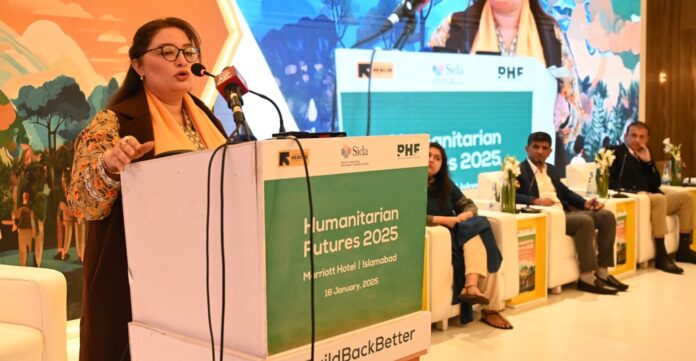ISLAMABAD, Jan 16 (APP): Coordinator to the Prime Minister for Climate Change, Romina Khurshid Alam, Thursday urged the development of a comprehensive National Climate Risk Management Strategy to address escalating natural disasters and mitigate their economic, social, and environmental impacts.
Speaking at the “Humanitarian Futures” event organized by the International Rescue Committee (IRC), she called for improved access to international climate financing to support disaster preparedness and resilience projects.
“Access to climate funds is essential to strengthen our capacity to mitigate climate change impacts and support sustainable recovery efforts,” Ms. Alam remarked.
Additionally, she advocated for incorporating disaster risk financing into the global loss and damage agenda.
Romina said, “Innovative financial tools, combined with inclusive and data-driven strategies, are essential for managing the rising costs of climate change and fostering resilience across communities.”
The “Humanitarian Futures” event served as a timely platform for discussing international collaboration and strategic responses to climate risks. Ms. Alam’s address underscored the necessity for urgent and coordinated action to confront the ongoing climate crisis and build a resilient future for Pakistan and beyond.
She stressed the urgent need for preparedness at the national, provincial, and district levels. She emphasized the importance of protecting vulnerable communities and securing sustainable livelihoods amid mounting climate challenges.
The event brought together government officials, humanitarian agencies, academics, climate scientists, and meteorological experts to discuss strategies for tackling the growing threat of climate-related disasters.
Ms. Alam highlighted Pakistan’s heightened vulnerabilities to extreme weather events such as devastating floods, heatwaves, droughts, desertification, and erratic rainfall. She noted that these challenges have profound economic, social, and environmental repercussions, disproportionately affecting marginalized populations.
She said, “Pakistan has faced severe climate catastrophes, including the catastrophic 2010 floods and the unprecedented 2022 floods, which displaced millions, destroyed crops, and severely damaged infrastructure. These disasters underline the critical need for flood resilience and disaster risk reduction measures.”
She outlined the significant climate initiatives launched at COP29 in Baku, Azerbaijan, including the Global Shield, climate justice programs, climate-smart agriculture projects, renewable energy solutions, Pakistan’s Green Recovery Plan, and nature-based solutions. These efforts aim to combat climate change and build resilience.
Ms. Alam also emphasized Pakistan’s dependence on glaciers and rivers for water, warning of acute water shortages that threaten agriculture—a cornerstone of the national economy. “Water scarcity is a critical issue for our agriculture sector, and we must invest in long-term solutions to address this challenge,” she stated.

